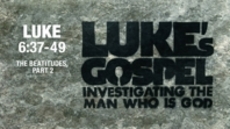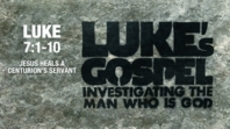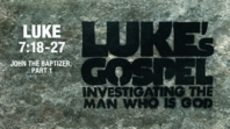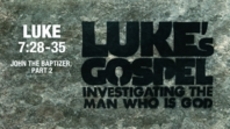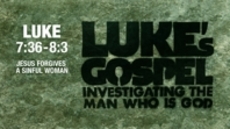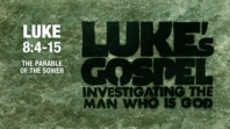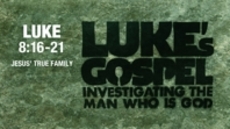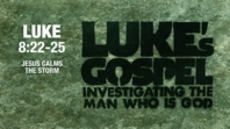
Can’t see the video? Download and install Flash to be able to view. Get Flash Here
Jesus finds wrecked people. He pursues people who don’t ask for him and comforts people who don’t seek him. Jesus literally reaches into death and brings life, both for the dead son of the widow and for all Jesus’ people. Dead people do nothing to participate in their healing; it is solely a gift of grace. Jesus is an even greater risen son who conquered death for all the children of God.
11 Soon afterward he went to a town called Nain, and his disciples and a great crowd went with him. 12 As he drew near to the gate of the town, behold, a man who had died was being carried out, the only son of his mother, and she was a widow, and a considerable crowd from the town was with her. 13 And when the Lord saw her, he had compassion on her and said to her, “Do not weep.” 14 Then he came up and touched the bier, and the bearers stood still. And he said, “Young man, I say to you, arise.” 15 And the dead man sat up and began to speak, and Jesus gave him to his mother. 16 Fear seized them all, and they glorified God, saying, “A great prophet has arisen among us!” and “God has visited his people!” 17 And this report about him spread through the whole of Judea and all the surrounding country.
The Holy Bible, English Standard Version copyright © 2001 by Crossway Bibles, a publishing ministry of Good News Publishers. Used by permission. All rights reserved. Quotation information.
Luke 7:11–17
11 Soon afterward he went to a town called Nain, and his disciples and a great crowd went with him. 12 As he drew near to the gate of the town, behold, a man who had died was being carried out, the only son of his mother, and she was a widow, and a considerable crowd from the town was with her. 13 And when the Lord saw her, he had compassion on her and said to her, “Do not weep.” 14 Then he came up and touched the bier, and the bearers stood still. And he said, “Young man, I say to you, arise.” 15 And the dead man sat up and began to speak, and Jesus gave him to his mother. 16 Fear seized them all, and they glorified God, saying, “A great prophet has arisen among us!” and “God has visited his people!” 17 And this report about him spread through the whole of Judea and all the surrounding country.
Alrighty, Mars Hill, we’ll be in Luke 7, starting in verse 11. If you’ve got a Bible, feel free to go there.
Father God, as we come to a devastating section of Scripture, I pray you would devastate us. As we come to a liberating section of Scripture, I pray you would liberate us. As we come to a rising section of Scripture, I pray you would give us hope and faith in the day of our own resurrection. And God, I ask and invite you, Holy Spirit, to be with us, so that we might come to know Jesus if we don’t know him. Come to trust him if we don’t fully and necessarily. And Lord God, come to worship him if we find it hard to do so because of suffering. And we ask for this grace in Jesus’ good name. Amen.
Today, we’re going to look at a story of a dead man. So, I’ll start with this question: Do you remember the first funeral you went to? The first person that you really loved who died? I can still remember the first funeral I went to. I was ten years of age. My Grandpa George died. I loved, absolutely loved my Grandpa George. All of my memories of my Grandpa George are fantastic. Upstairs near my bedroom, there’s a photo of him. I remember him all the time. I tell my kids stories about Grandpa George. He was loving, fun. I spent tons of hours at his house. Go out to breakfast, hang out, build stuff. I remember him teaching me how to ride a bike that was way too big, and I almost killed myself. I remember he was great, teaching me how to use lots of woodworking tools and to build things. He built me my first basketball hoop. And I can still remember going to his funeral. And being ten, I’d really not ever thought about death, never really considered that Grandpa George would die. And I remember going home from the funeral, and every time I’d shoot hoops, it just seemed curious to me that the backboard that I had made with my grandfather outlived my grandfather.
Death is painful. It’s usually preceded by suffering, sometimes it is completely unexpected, and it comes for us all, because the wage for sin is death, and all have sinned. And this world is not the way that God made it to be. This is the way that we have made it to be through sin, and rebellion, and folly. And when we suffer, sometimes we do foolish things, and get angry, and bitter, and mad at God for suffering that he didn’t create, that we did.
And as we get into the story, you’re going to meet a woman who is at a funeral. And I want you to emotionally connect with this widow who is burying her only son. Horrible, horrible, horrible day. You’re going to have days like that in your life where you’re absolutely wrecked. You will be wrecked. Some of you will be there for a gaze and a glimpse into the days of other people’s lives when they are absolutely wrecked, when suffering comes, when sickness comes, when death comes for them.
All right, to be honest with you, I wasn’t really at all prepared for this, going into ministry. We started Mars Hill as a Bible study about fourteen years ago. And at the time, I was twenty-five, gathering a core group. And I thought, “Okay, I’m going to teach the Bible, and I love people. We’re going to see lost people meet Jesus.” And I was not prepared at all for the devastation of wrecked lives. Hadn’t been a pastor at any church. Had never been a member at any church. We didn’t gather a lot of mature, healthy, helpful people. We gathered a lot of broken, devastated, wrecked, largely young, non-Christian people.
I still remember my first hospital visit. All my hospital visits to that point, and there had only been a few, were to go congratulate someone because their baby was born. And I got a call from a young man in the congregation, was a newer Christian, came from a rough background. He had no living family except for his mother. And he said, “I need you to come to the hospital. It’s an emergency.” So, I got in my car and went downtown, very late at night. And I met him in the waiting room. And I said, “Okay, what’s the situation?” He said, “Well, you know, you know my story, new Christian, non-Christian family. My mom’s my only living relative. She went to a Seattle area park, doused herself in gasoline in her car, and set herself on fire. And she’s brain dead. Her entire body is burned up, but they’ve got her heart beating on a ventilator. What do I do? Because she’s not a Christian, and she doesn’t love Jesus. And if I pull the plug, she dies and goes to hell. And this is my only relative. What do I do?” And I remember just sitting there thinking, “I am not ready for this. This man deserves far more than I’m able to give him at this point.”
And as a pastor, over the years, just continually being wrecked in my own life, and seeing other people’s lives get wrecked, and being wrecked for them. It’s why I always hate it when pastors just make every story a good story, and every verse a happy verse, and every tale has a glorious ending. And they don’t really do the work of connecting with people who are suffering and hurting. Sometimes we get complaints as a church, “Oh, those big megachurches, they just don’t care about people.” No, if you care about people, sometimes you get a lot of them. That’s how we built this church. We care for hurting people, and so lots of hurting people come. If you just took all the women in our church who were raped or molested, you would have a megachurch of just victims.
We’re not immune, as pastors and leaders, from the suffering, and the pain, and the hurt in people’s lives. And that includes individual pastors. I’ll tell you a story about Pastor Chris Swan. He’s the campus pastor over at our Bellevue campus. Been a friend of mine for over a decade. His wife, Susan, is fantastic. They’ve had twenty-six pregnancies, and three children, and twenty-three miscarriages, twenty-three miscarriages. Pastor Chris, on his body, he’s got the number 18, the number 20, and the number 25 tattooed on his body. Those are the three pregnancies that actually resulted in children. Above those numbers is tattooed the name of his wife, Susan, as a memorial to her, ‘cause she’s been through a lot. They finally, after having a few daughters, and desperately wanting a son, decided, “You know, we’re just going to need to stop trying. At this point, let’s just stop.” And so, he had a vasectomy, and ultimately just accepted that he would never have a son. And then, he felt that God spoke to him and said, “I’ll give you a son. Trust me again, and have a reversal.” So, he did. And had a few more miscarriages. And then, God, in his grace, gave him a baby boy. I’ve seen that boy. He’s spoiled. Between his sisters, and his mother, and his dad, he is well cared for.
Pastor Dave Bruskas, your Albuquerque campus pastor—I asked people to write up their stories on Facebook and The City. I have maybe hundreds of them. I can’t share them all with you. Pastor Dave Bruskas wrote his story. He said: “From the time I became a thirteen-year-old Christian, I prayed God would give me a son that would change the world. Kara,” his great wife, “and I had one daughter, Lisa, at the time our son, David Michael, was born. Ultrasounds detected no problems, nor were there any evidences of illness during his birth. Within hours of his birth, we discovered he had a congenital heart defect, and would require surgery. His cardiologist gave us this prognosis: ‘David would be the little kid who could jump off the diving board, and swim in the pool, but his heart condition wouldn’t allow him to compete on the swim team.’ This seemed like a minor issue, as we would love and enjoy this son we had prayed for with his small limitations. David was transported to the Children’s Hospital ICU for surgery. Two months and four days later, David’s heart simply gave out. He had undergone many surgeries, and many more procedures.” Nothing like seeing a little kid who’s got a lot of scars. “We never saw him successfully removed from his ventilator. He never left the ICU. I held him in my arms as the doctors disconnected his life support, and he went to be with Jesus quickly. I think David’s death has impacted me in several ways. First, I have learned Jesus is real, and comforts those who hurt. I have never before or since experienced his presence more powerfully than on the day we buried our son. And Jesus is better than all the sons and daughters he gives to mom and dad. Second, the ache never goes away completely. It isn’t as constant as it used to be, but there are still moments that I slip away and weep, or that Kara and I spend date nights remembering David through tears. Third, I’m so grateful for every moment that I have with my children. I no longer fear death as an unknown entity, theirs or mine. But I do realize, while eternity is guaranteed through Jesus, tomorrow on earth isn’t. Lastly, I long to be with Jesus, totally freed from sin, away from this fallen world, not so much in a morbid way, but like Paul who says, ‘For me, to live is Christ and to die is gain.’ The last time I held my son was to release him to be with Jesus. The next time I hold him, we will both be with Jesus forever.”
Dave’s a good friend. Every time he comes to the house—he was over recently—I see him watch my three boys. They’re usually doing something ridiculous. And he just watches ‘em. And you can tell that he wishes his son were alive.
I got here this morning. I got a text message from one of my dearest friends. He’s vice-president of Acts 29, pastors a church in St. Louis. He says, “Please pray for my seven-month-old daughter. She has a very severe and rare form of staph infection. We’re rushing her to the hospital right now.”
Your life is going to be wrecked. My life is going to be wrecked. And the more people you love, the more occasions you will have to be wrecked. And as we come to Luke today, I want you to emotionally connect with me, so that we can really appreciate an amazing woman. And we learn this, that Jesus finds wrecked people. That’s what he does. That’s our Jesus. God comes to earth as the man Jesus Christ, and he goes looking for absolutely wrecked people, people on the worst day of their whole life.
Luke says it this way: “He went to a town called Nain, and his disciples and a great crowd went with him. As he drew near to the gate of the town, behold, a man who had died was being carried out.” Do you feel that? Read these lines, “The only son of his mother, and,” what? “She was a widow, and a considerable crowd from the town was with her. And when the Lord saw her, he had,” what? “Compassion on her.” Compassion on her. This is a devastating day. This is a wrecked woman.
She’s in a town called Nain. Just so you know, this town doesn’t appear any other time in the Bible. This is a very unimportant place. It’s nowhere. It’s nowhere. It’s twenty miles to Capernaum, six miles to Nazareth. Nazareth is nowhere. Capernaum is nowhere. It’s twenty miles to Capernaum, six miles to Nazareth. I’ve been in that region. It’s still nothing. This is a small, little village. This likely means that this woman is poor, because everyone who lives there is poor. She’s probably illiterate, can’t even read the Scriptures for herself. Nearly all the women in that day, in that place, were illiterate.
Here’s what we know about her: she’s already been to one funeral. Who’s funeral has she been at? Her husband’s. She’s buried her husband. Ladies, think about that. The Bible gives particular affection to widows and orphans. She’s a widow. She buried her husband. Ladies, I don’t know what’s going on with your husband, what you’re fighting about, what you’re bitter about, what you’re nagging him about. Please take care of it, so that when you do bury him, you don’t have regrets.
She buried her husband, and now what is happening is she’s burying her son, not just her son, her only son. And in that day, the son would grow up to look after his mom. He would love her, care for her, nurse her when she was sick, feed her. There was no such thing as social security or retirement, especially for a poor woman in a nowhere town like Nain. This woman is absolutely wrecked. She had a great life. Like some of you ladies, she had a husband, she had a son. She buried her husband. She’s going to bury her son.
I don’t know if there’s anything more devastating than a parent burying a child. I mean, I preach funerals for children. There’s nothing like that. Grace had a miscarriage. We lost one of our own children. That was devastating enough. I saw my own sister give birth to twins prematurely. They both died. And she got to hold them… dead. She miscarried again last week.
This woman’s life is wrecked. And what we see is that Jesus comes to her. I love that. What we don’t see is her asking for Jesus. She doesn’t ask for Jesus. Jesus just comes to her. And Jesus goes out of his way to get to her. Jesus walks, likely, a few days, or at least a day over hilly terrain, crowds following him, multitudes pursuing him. They all want him to stop. They want him to ask questions. They want him to pray for them. They want him to plant a church, teach a Bible study, meet their needs, cast out their demons, heal their illnesses. And for reasons that Luke does not know, because he doesn’t have the mind of God insofar as knowing everything that God knows, he only knows what God reveals, Jesus goes to Nain. He gets to Nain, so that he can get to this woman. And as he’s coming into town, the whole village is out. And everyone’s mourning and grieving for this poor woman, this widow. The professional wailer would’ve been wailing. Flute players would’ve been playing. This was a loud, community-wide event. The village has essentially shut down. Everyone is weeping and bawling. This young man’s friends are weeping. All the families who know this family are weeping. The friends are embracing this woman, because she is devastated. And this is the second funeral they’ve attended with her.
And Jesus shows up. And this is how our Jesus works. He comes to people who don’t ask for him. He comforts people who don’t seek him. He goes out of his way to pursue people who aren’t even aware of him. That’s our Jesus. This is where we get things like our doctrine of election. Jesus has chosen to get to her. Jesus has chosen to love her. Jesus has chosen to pursue her. Jesus has chosen to serve her.
Our Jesus finds wrecked people. And I know some of you come here today, and you’re absolutely wrecked. And Jesus comes to meet with you. And some of you know people who are absolutely wrecked, and you’re devastated for them. You need to know that Jesus can, and does, pursue them. Jesus does find wrecked people, and it’s so unusual, because this is not how we generally work. How many of you, when you find out that someone is really suffering, really hurting, you almost have to force yourself to pursue them? It’s going to be exhausting. It’s going to be devastating. It’s going to be hard work to love them. Emotionally, it is costly. And that’s what our Jesus does. He seeks and he finds wrecked people. I just want you to see that.
Number two: Jesus does something. He touches dead people, and he brings life. Luke 7:14–15, “Then he came up and touched the bier, and the bearers stood still,” those carrying the body. It’s an open-casket funeral. Can you think of anything sadder than an open-casket funeral for a young man or a boy? “And he said, ‘Young man, I say to you, arise.’ And the dead man sat up and began to speak,” and there is the most glorious line, “and Jesus gave him to his mother.”
The religious people would tell you that Jesus shouldn’t do this. They would say that the dead body is therefore defiled, and the men who are carrying the open casket—have you ever seen an open casket? My Grandpa George died. They had an open casket. As a ten-year-old boy, I walked up, and I saw my dead grandfather. It was the most disorienting experience of my whole life to that point. You’re not supposed to reach into the casket, and you’re not supposed to touch a dead body. Why? Because it is ceremonially unclean. It’ll make you defiled. And Jesus walks right up to the body, reaches into the casket, and what does it say? “The bearers stood still.” Everyone is shocked, “What is he doing? He cannot touch the unclean dead.”
And Jesus reaches literally into death, and he touches the young man, and he gives him a command. What does he say? “Arise,” one word. “Young man, I say to you, arise.” The command is one word. And what happens? “The dead man,” this is a clinical diagnosis from Luke who’s a physician, this is a dead man, “sat up and began to speak.”
Can you imagine the emotional transition in that moment? The man sits up, and starts talking, gets out of the coffin, and Jesus escorts him. I mean, I can see it. Jesus escorts him over to his mother. Can you see her face? Can you feel her joy? How long do you think she held her son for? Think she was screaming with joy, jumping up and down? Think tears of shock and joy are coming down her face? She got her son back. She got her son back alive, and well, and restored to health.
And that’s what our Jesus does. He touches dead people, and he brings life. If I might work from this for a moment, he does this for us, first of all, to make us Christians. This is actually a very helpful analogy for salvation. I’ll read it to you from Ephesians 2:4–5, “God, being rich in mercy, because of the great love with which he loved us, even when we were dead in our trespasses, made us alive together with Christ.” What the Bible says is that because we are sinners, though physically alive, we are spiritually dead. We are spiritually in the same condition as this man. We are dead. We do not seek God. The Bible says that no one seeks God. We do not find God. This man was not crying out for help. This man is not seeking Jesus. This man is not running to Capernaum to find Jesus, and to get healing. This man is dead. This man does nothing. This man says nothing. This man seeks nothing. And Jesus finds him. And he doesn’t reach out to Jesus. Jesus reaches out to him. And he doesn’t participate in his revivification, or his healing. He receives it as a gift of grace.
That is, friends, how salvation works. That you and I, as Paul says, we’re dead in our sin, absolutely dead. And Jesus finds us, and Jesus reaches out to us, and Jesus touches us, and Jesus gives us spiritual life. He gives us a new heart, a new nature, a new power by the Holy Spirit. Anyone who is a Christian, to some degree, you’ve experienced this in your own life. I experienced it at age nineteen. I went from spiritual death to spiritual life. And I didn’t do anything. Jesus reached down into my death and touched me. That’s what he did. And see, this doesn’t make Jesus unclean, because he’s perfect and holy in God, and without sin. So when he touches the man, he is not made unclean, the man is made clean. He does not receive the death. He gives life. This is how it works. If you’re a Christian, you’ve experienced this. If you’re not here today and you’re wondering, “How in the world do I get connected to God?” It is Jesus who gives life.
Number two: on occasions throughout this life, Jesus actually does heal those who are sick. We have seen it in Luke’s gospel. Does he heal everyone? No. Does he heal some? Yes. To this day, our Jesus can, and does, still heal, and so we, in prayer, ask him to. And sometimes, yes, our Jesus actually raises the dead in this life. Here, it is what I will call and distinguish as revivification. Resurrection is when you rise in a glorified body, never to die again. That will happen at the end of the age. Revivification is where a dead person receives life, comes back in a mortal body, and lives for a duration of time, and then, ultimately dies again, one day to rise again, to receive a glorified, resurrected, perfected body that will never taste death again. So, this is not his resurrection body. This is his revivification body. And Jesus does this—does it happen a lot? No. No. No, it doesn’t. Jesus only brings back three people from death, according to the New Testament: Lazarus, his friend, Jairus’ daughter, a little girl, one of my daughter, Alexi who’s 6, one of her favorite stories in the Bible, and the widow’s son, only three people. It’s not an often occurrence. It’s a rare occurrence. But it’s showing us the power of Jesus over death. And it’s showing us the kingdom of God, and how things will ultimately be in the end.
And that leads me to my third point: that one day, we will all rise. We will all rise, as this man rose. That death is an enemy. That death is unnatural. That death is the result of rebellion and sin. And Jesus Christ is the one who conquered death. He says this in John 5:28–29: “An hour is coming when all who are in the tombs will hear his voice and come out, those who have done good to the resurrection of life, and those who have done evil to the resurrection of judgment.” Jesus says everyone who dies will rise, and they will stand before him. The context here is that Jesus is the judge. You don’t judge yourself. Jesus judges you. I don’t judge you for heaven or hell. Jesus does. And Jesus says that all who die will rise and stand before him for judgment. Those who belong to him, and live life with him, receive eternal life. Those who do not belong to him, and do not live life with him, receive eternal death, and damnation, and condemnation. So, I want you to see that what Jesus is doing here, in addition to loving the widow, and raising the son, he is also unveiling the kingdom. See, our Jesus is a king, and he’s bringing a kingdom, and you and I will rise, and resurrection is a revelation of the kingdom. It’s a foreshadowing. It’s a glimpse into what God intends for us all at the end of the age.
Now, some of you will ask whether or not this, in fact, really did occur. It did. A dead man was brought back to life. Quadrus wrote to the Emperor Hadrian less than a hundred years after this raising of the widow’s son—and this is ancient history: “The persons who were healed, and those who were raised from the dead by Jesus, were not only seen when they were healed and raised, but were also present also afterwards, and not merely during the time that the Savior walked upon the earth. But after his departure also, they were still there for a considerable time, so that some of them lived even until our times.” This ancient historical record going to the Emperor Hadrian says, “Yeah, Jesus healed people, and he rose a few from death. Many of them lived a long time, and some of them are still alive, and we’ve actually talked to them.”
Number three: Jesus is a greater risen son. “Fear seized them all, and they glorified God, saying, ‘A great prophet has arisen among us!’ and ‘God has visited his people!’ And this report about him spread through the whole of Judea and all the surrounding country.” They’re going to respond, first of all, with worship. When it says that great “fear seized them all,” they were amazed, they were in awe, they were shocked that this Jesus had this authority and power over death. And so, they worshiped him. We need to respond today by worshiping the living Jesus. It says that news of him spread. So, they started doing evangelism, and getting the word out. People went to work, and school, and back home, and about their daily routines as missionaries for Jesus, talking about Jesus. “Jesus is amazing, do you know him? Can I talk to you about him?” See, the right response to the person and work of Jesus is worship and mission.
And ultimately, Jesus is a greater son. You think about it. The parallels are curious. Jesus comes as the only begotten Son of God the Father. He is dearly loved, as this son was. He is a one-of-a-kind son. He’s the Son of God. This son was the only son of this woman. The Father loved the Son. We heard that earlier in Luke at Jesus’ baptism. And here, it’s obvious that the mother loved her son. And just as this son died, so Jesus, the greater Son, he died. He died, not for any sin that he committed, but in our place, for our sins. And as this young man rose from death, so Jesus, as a young man, did what? He rose from death. To conquer death for all of the children of God. To conquer death for all of the children of God. That Jesus is the greater Son.
So, for those of you who are suffering, or your life is wrecked, or for those of you who will have the great gift of being with those who are suffering and dying, I need you to know that you have a sympathetic high priest in Jesus. You have one who has been there. You have one who has tasted the full sting of the consequence of sin that is death. Our God is not immune from suffering. Our God is not indifferent toward suffering. Our God is not negligent toward death. Our God, Jesus, is the greater Son. He absolutely unequivocally, fully, thoroughly, completely knows what it is like to suffer and die. And he does so for you, for your sin. And he does so in love.
Furthermore, for those of you who have buried someone that you love, I want you to know that God the Father is one who fully identifies. The Father was present for the death of God the Son. He was there. He was there. The Father experienced—and even that the Bible would use that language that God is the Father, and that Jesus is the Son, and that Jesus would suffer and die, then you know what the Father felt.
I’ll read one testimony. I feel compelled to by the Holy Spirit. I didn’t intend to. “Our middle son, Jason, died on a rainy Thursday night on his way to basketball practice, January 4, 2004. Our whole lives are divided into before that day, and after that day. Everything is before Jason died, or after Jason died. My husband made it to the scene of the accident while Jason was still alive.” Imagine that, Dad, you get a call. “Your son’s been in a car wreck.” “Where is he?” “Here.” You jump in the car, rainy night, drive there as fast as you can. “He couldn’t get the door open, but he was able to reach through, hold his hand, and tell him that he loved him.” The father was holding the son’s hand as he died in the car. They have a lot to say, and it’s quite good, but they say this a bit later. “Hope is all we have, hope of a life with Jesus, hope of a reunion with our son, and hope that our son’s death has and will be used to glorify God.”
This dad says: “My wife and I lost triplet boys in the hospital,” triplet boys. “Joshua was born January 3, 2007. The other two, Nathaniel and Caleb, were born January 12, 2007. We buried all of them together. What a dark time in my life. Each time we visit the grave site, I know we are much closer to a glorious reunion.”
The Father was present for the death of his Son. It was the worst atrocity, humanly speaking. It was the greatest injustice, humanly speaking, in the history of the world, that sinners murdered the Son of God. And the Father was there and he felt it.
So, let me say this for those of you who are suffering, your life is wrecked, or it will be wrecked. If your life is the one that is wrecked, I want you to remember Jesus, the greater Son, and I want you to go to him for comfort, and love, and support, and understanding, and encouragement. And I want you to be in community with his people. What we see with the widow of Nain is that the community came around her in her moment of suffering. You need to be in a community group. You need to be a member of a church. You need to be connected to God’s people. You need others to rally around you when you are suffering. And you need to rally around them when they are suffering.
For those of you who will experience the death of someone who is loved, don’t accuse God of being evil. God is good. When God was done with this world, he said that everything was very good. God’s not a sinner. We are. God brought life. We brought death. God has been faithful to us. We have been unfaithful to him. And when we suffer, or we see one who is suffering, to accuse God of evil is a horrendous thing. And I know some of you, in your pain, and your frustration, and your struggle, and your strife, you’ll have questions and doubts. And that’s okay. Work ‘em through. Work out your salvation. It’s okay.
But we don’t worship a God who is immune from suffering. Our Jesus suffered and died. And we don’t worship God the Father who is indifferent towards suffering. If you’re hurting, he knows exactly what you feel like, and his promise is, “Trust me. Stick with me. We need to get through death. We need to get to the other side of the resurrection. I have worked out all things for good. I have a plan. And I know right now, it is exceedingly painful and I, myself, have felt that pain when my own son died, and I was there.”
And so, you and I find ourselves reading the story of the resurrection of the son, reminded of the resurrection of the Son of God. And God today would call us to worship him in faith, and get the good news out about Jesus, even though today truly feels like a funeral day. But there is a resurrection day. There is a resurrection day. And what’ll happen for the children of God is that Jesus will again reach down into death, he will again declare, “Arise,” dead people will come to life, and he will reunite them with those who love them. And in his presence, there will be resurrection and reconciliation. The Bible says that Jesus then will wipe every tear from our eyes, and sin and death will be no more. I just would implore you, Mars Hill. Suffer and weep as this woman did, mourn and cry as she did, surround and support one another as the people of Nain did, but by faith, trust that resurrection is coming, and this same Jesus, the greater Son, reaches down into death, and has life. And it will happen, and you will see it by the grace of God.
Father God, I pray for us as a people. God, I felt compelled by the Holy Spirit in teaching this text, not to just run to resurrection, and to whip people into an emotional frenzy that “It’s all going to be fine!” God, it will be fine, but it could be a long time. There could be a lot of wrecked days. There could be a lot of painful funerals. This woman had two funerals. Some of us have had many more. Lord Jesus, we thank you that you came into this world. We thank you that you suffered. We thank you that you were willing to die as a young man. We thank you that death could not hold you. We thank you that you are the greater Son, that you are the risen Son. Father God, we thank you that you understand the pain that we feel when we lose someone we love. And God, we thank you that you are the real God, and that you’re the resurrection God, and that you’re the living God. And by grace, we ask that you would right now reach down to those who are spiritually dead, and make them alive in Christ, that Lord God, they would enjoy that resurrection day as well. In Jesus’ name, Amen.
[End of Audio]
Note: This sermon transcript has been edited for readability.

Jesus Finds Wrecked People
May 09, 2010

Jesus Touches Dead People & Brings Life
May 09, 2010

Jesus Is A Greater Risen Son
May 09, 2010
